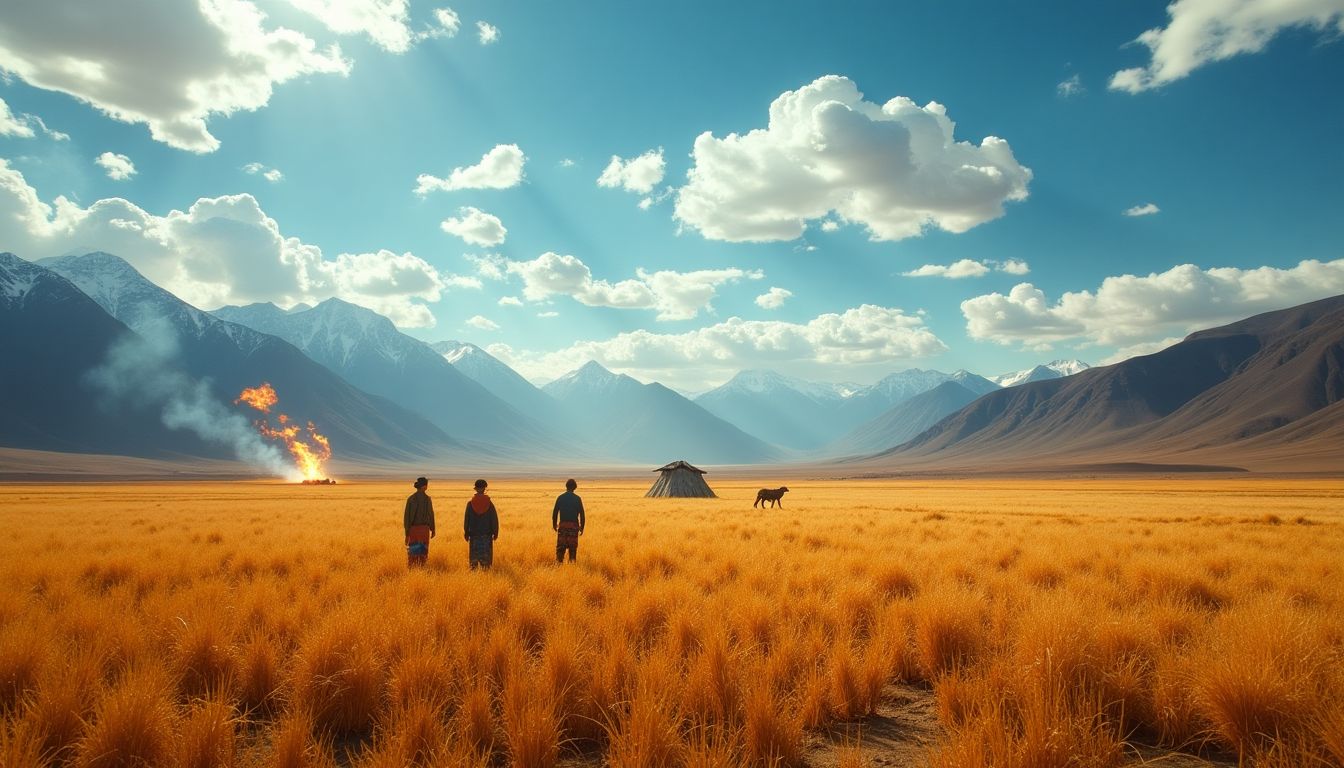The pyre burned high against the night sky, turning the vast Andean plains into a flickering sea of shadows. Kusi tightened her poncho, its vibrant hues of indigo and crimson a silent homage to the Wiphala, the Andean emblem of unity and identity. Her dark, almond-shaped eyes reflected the amber flames as she stood alone, the wind carrying whispers from the maize fields that surrounded her. But in the whispers, there was something more—a song of caution, a pulse of old truths buried in the soil.
She didn’t flinch as the pyre cracked and spat embers into the air. Her resolve was firm, her sinewy arms an evidence of years spent toiling under the merciless Andean sun. She was a woman of the land, her skin kissed bronze by Inti, the Sun God, and her jet-black hair braided with crimson ribbons that mirrored the flames. Around her waist hung a bag made from alpaca wool, its earthy tones clashing with the brilliant gold of the tupu—a traditional Andean pin—securing the folds of her outfit.
A Promise of Wind
The year was 2056, though the locals often joked that in the Andes, time moved both forward and backward. Nestled high above the chaos of post-modern metropolises, the descendants of the Tawantinsuyu clung to their traditions even as drones threaded through the skies above them. Kusi had once laughed at those machines—soulless, like mechanical hawks surveying the ruins of their ancestors' empire. But tonight, she wasn’t laughing.
"It begins tonight," said Sumak, his voice emerging from the shadows. He was tall and lean, his feathered headdress a nod to the leaders of old, though he wore jeans beneath his ceremonial tunic—a juxtaposition of the ancient and the absurdly modern. He handed Kusi a folded piece of parchment. The ink smelled fresh.
“This is what he declared?” Kusi asked without unfolding it. Her voice was steady, betraying none of the turmoil inside.
Sumak nodded. “By morning, the fields could be theirs. The harvest consigned to the machines.”
She unfurled the parchment, her heart pounding as her eyes scanned the blocky, digital print—a decree from the president of the Coalition for Global Harmony. The indigenous farmers would surrender their ancestral lands for "integration" into a network of automated agricultural hubs. It spoke of efficiency and abundance, but the language was sterile, devoid of the heartbeat that tethered Kusi to this place.
“And what did the grains whisper to you, Kusi?” Sumak prodded gently, gesturing at the swaying fields.
Her lips tightened. It was an old superstition—the belief that maize spoke to those willing to listen—but Kusi had heard. The grains had warned of blood mingling with water, of sparks igniting not just pyres, but revolutions.
The Hymn of Resistance
Nightfall thickened as others began to gather. Farmers, artisans, elders—men and women whose faces were etched with lines of hardship. They stood around the pyre, their traditional garb layered with the oddity of modern accessories: digital wristbands tracking their vitals, goggles designed for augmented reality. Kusi stepped forward, their de facto leader. She had earned that place, not by seeking it, but by standing unwavering when others faltered.
“Do you remember the stories of Mama Pacha?” she asked, calling to the goddess who had always protected the earth and its children. She saw the silent nods, the glimmers of hope igniting beneath the fear. “Then you will know she sees everything, even now. You will know she will lend us her might if we listen to her call.”
The pyre spoke as well, the flames rising higher, casting grotesque shadows onto the ground where the parchment now lay, curling and blackening. Around the fire, people joined hands, humming a melody that had once echoed in the halls of the sun temples. It was music born from rebellion, from a culture refusing to be erased.
Steel Against Maize
When dawn cracked the night in half, the whirr of machines filled the air. Automated drones buzzed down from the hills, their metallic bodies gleaming in the soft morning light. Behind them, tanks rolled forward like beasts of war, their barrels cold and unblinking. The Coalition’s enforcers had arrived.
Kusi stood at the edge of the fields, wearing an embroidered chullo hat for the chill but draped with the same vibrant poncho. She leaned lightly on a wooden staff adorned with carvings of condors and snakes. To the enforcers, she cut an almost majestic figure amidst the whispering maize—a lone woman standing at the threshold of a dying tradition.
"Step back," the lead enforcer commanded through a loudspeaker, his voice mechanical and inhuman. “This land now belongs to Humanity’s Collective Future.”
The crowd gathered behind Kusi and began to chant, their words echoing like drums. She raised her staff, quieting them, her eyes locked on the machines. “Inti warms this soil,” she said calmly, “and Mama Pacha nourishes it. Humanity’s future is already here, in this land.”
The drones paused as if debating. Then, with a shriek, they surged forward.
The Pyre Burns Bright
The farmers fought not with guns or drones of their own, but with the earth itself. Traplines snapped, sending nets woven from ichu grass over the machines. The irrigation ditches overflowed, summoned by hidden pumps, short-circuiting circuits. People moved as one, guided by whispered warnings carried through maize and soil.
But victory was no certainty. Metal clashed with wood and bone, and though the farmers’ attacks were ingenious, the Coalition’s resources were monstrous. The battle waged through hills and valleys, an uneven symphony of grit and inevitability.
By the time the sun kissed the horizon goodnight, Kusi knelt in the fields, her poncho tattered, her left arm bleeding. She planted her staff firmly into the tilled earth, refusing to fall. Around her, the maize swayed violently, as though taking its own stand. The grains whispered louder now, mixing with the wind and Kusi’s ragged breaths.
“You still hear them, don’t you?” Sumak appeared, his tunic torn, his jeans caked in mud. He knelt by her side, his eyes scanning the valley now littered with the remnants of both machine and man.
“They speak of what’s to come,” Kusi murmured, leaning against her staff. “This is not just our fight anymore. This land will be remembered.”
The Cycle Continues
The Coalition ultimately deemed the Andean plains a “low-efficiency zone,” retreating to more fertile, compliant lands. They branded the farmers extremists, though their resistance sparked global conversation about indigenous rights, unity, and the limits of technological dominion.
Kusi continued to tend her fields, though her arms grew heavier each season. The maize still whispered, but now its song carried hints of triumph, of a land remembered in legends rising like smoke into the skies.
The Source...check out the great article that inspired this amazing short story: Argentina's Transformation: One Year Under President Milei
Disclaimer: This article may contain affiliate links. If you click on these links and make a purchase, we may receive a commission at no additional cost to you. Our recommendations and reviews are always independent and objective, aiming to provide you with the best information and resources.
Get Exclusive Stories, Photos, Art & Offers - Subscribe Today!

























1 comment